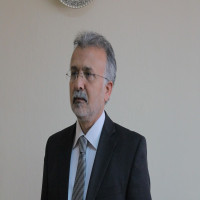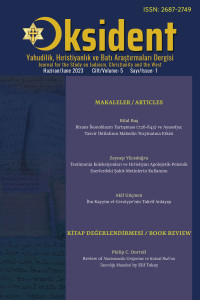Research Article
Book Review
Aim & Scope
Oksident is a peer-reviewed electronic journal published twice a year on 30 June and 31 December. It continues to be published as an open-access academic journal published regularly by Garbiyat Studies Application and Research Center at Bursa Uludağ University since 2019.
Oksident aims to be a platform/journal that brings together the publications of expert academics on Judaism, Christianity and Western Studies in Turkey. The journal includes academic studies on these topics. In addition, it aims to be a journal in which Western/Orientalist studies on Islam are evaluated. But in doing so, it does not adopt an approach that completely rejects and marginalizes western works; on the contrary, a perspective that appreciates the truth is adopted while criticizing the wrong aspects of these studies.
Scope
- Studies on the history, beliefs, rituals and social dimension of Judaism.
- Studies on the history, beliefs, rituals and social dimension of Christianity.
- Muslim-Christian Relations, Muslim-Jewish Relations, Christian-Jewish Relations
- Polemics among Muslims, Christians and Jews
- Research on Europe and America
- Evaluation of Orientalist studies on Islam
- Studies on the relationship between religion and society, religion and politics in the West
Author Guidelines
OKSİDENT is a peer-reviewed journal published twice a year in June and December.
Our journal includes articles on Judaism, Christianity, Muslim-Jewish Relations, Muslim-Christian Relations, Christian-Jewish Relations, religion-society and religion-politics relations in Europe and America.
Articles must be original or unpublished.
Our journal will primarily include articles that try to find answers to a question or provide solutions to a problem. Research articles, book reviews, literature reviews, and translations are also published in our journal.
Manuscripts must be submitted via the dergipark system. Click here for a visual description of how to send an article to a journal in the journal.
Articles (excluding abstracts and bibliography) should not exceed 6000 words (approximately 20 pages).
Articles may be written in Turkish or English.
Bibliography should be included at the end of the articles.
MECRA Citation System should be used in footnotes and bibliography.
Our journal uses the double-sided blind referee process. Referee names are not published in the journal.
Articles submitted to the journal are first passed through plagiarism query. Then, it is examined whether the article deals with a subject covered by the journal. Finally, “Preliminary Review” is completed by evaluating in terms of figures, footnotes and bibliography.
After the preliminary examination, the articles are sent to 2 referees for evaluation.
The article which receives positive reports from both referees is accepted to the journal. If the referees disagree about the publication of the article, the article is sent to the third referee.
The authors whose articles are accepted for publication are required to have an abstract of 150 words and a summary of 750 words in Turkish and English languages.
Authors who submit an article to our journal are deemed to have declared that they comply with the rules of scientific ethics.
Our journal does not charge any fee for application or publication.
Ethical Principles and Publication Policy
Publication Ethics and Malpractice Statement
Correction, Retraction, Expression of Concern
The editor should consider publishing a correction if minor errors that do not affect the published paper’s results, interpretations, and conclusions are detected. The editor should consider retraction if significant errors and/or misconduct that invalidate results and conclusions are detected. The editor should consider issuing an expression of concern if there is evidence of research or publication misconduct by the authors, or if there is evidence that the findings are unreliable, or if the institutions of the authors do not investigate the case, or if any potential investigation appears unfair or insufficient. The guidelines of COPE are considered regarding correction, retractions, or expression of concern.Plagiarism Action Plan and Journal Precautions
The journal respects intellectual property and aims to protect and promote the original work of its authors. Articles containing plagiarism are against quality, research, and innovation standards. Therefore, all authors submitting articles to the journal must comply with ethical standards and avoid plagiarism. If an author is suspected of plagiarism in a submitted or published article, the journal’s Ethics Editor reviews the work first. The Editorial Board then reviews this work. The Journal then contacts the author(s) to submit their comments within two weeks. If the journal does not receive any response from the author within the specified time, it requests the investigation of the claim by contacting the university to which the author is affiliated. The journal will take the following serious precautions against published articles that are found to contain plagiarism.- The journal will immediately contact the university to which the author(s) are affiliated to take final action against the related author.
- The journal will remove the PDF copy of the published article from its website and disable all links to the full-text article. The phrase Plagiarized Article will be added to the published article’s title.
- The journal will disable the author’s account and reject all future submissions by the author for three years.
Submitted manuscripts that pass preliminary control are scanned for plagiarism using iThenticate software. If plagiarism/self-plagiarism is found, authors will be informed. If required, editors may resubmit the manuscript for similarity check at any peer-review or production stage. High similarity scores may lead to the rejection of a manuscript before and even after acceptance. The percentage of similarity score taken from each article, the overall similarity score is generally expected to be less than 20% excluding footnotes and bibliography.
Studies Based on Survey and Interview
- Ethics committee approval should be obtained for research conducted in all disciplines that require ethics committee approval. This approval should be stated on the article’s first page, and the ethics approval document should be uploaded to the Dergipark system with the article.
- In research that requires ethics committee permission, information about the permission (name of the committee, date, and number) is given in the method section and after the bibliography section of the article; In case reports, information about signing the informed consent/consent form should be included in the article.
Special Issue
Our journal can publish a special issue upon the request of the Editorial Board.Publication Policy
The articles sent to our journal for publication are first subjected to an editorial review and checked to determine whether they have been prepared under the journal’s publication policy and writing principles. It is then subjected to a similarity scan to prevent plagiarism. Articles that pass these stages without any problems are included in the peer review process using the double-blind model.
1. Publication and authorship
- List of references and financial support;
- No plagiarism, no fraudulent data. As a result of plagiarism control, articles with a similarity rate of 20% or more are directly rejected in accordance with the journal’s publication policy.
- Forbidden to publish the same research in more than one journal.
2. Author’s responsibilities
- Authors are obliged to participate in the peer review process;
- All authors have significantly contributed to the research;
- Statement that all data in the article are authentic;
- All authors are obliged to provide retractions or corrections of mistakes.
3. Peer review/responsibility for the reviewers
- Judgments should be objective;
- Reviewers should have no conflict of interest with respect to the research, the authors, or the research funders;
- Reviewers should point out relevant published work which is not yet cited;
- Reviewed articles should be treated confidentially.
4. Editorial responsibilities
- Editors have complete responsibility and authority to reject/accept an article;
- Editors should have no conflict of interest concerning articles they reject/accept;
- Only accept a paper when reasonably sure;
- When errors are found, promote the publication of correction or retraction;
- Preserve the anonymity of reviewers.
- No plagiarism, no fraudulent data.
5. Publishing ethics issues
- Monitoring/safeguarding publishing ethics by the editorial board;
- Guidelines for retracting articles;
- Maintain the integrity of the academic record;
- Preclude business needs from compromising intellectual and ethical standards;
- Always be willing to publish corrections, clarifications, retractions, and apologies when needed.
Duties of the Publisher
Oksident is committed to ensuring that commercial revenue has no impact or influence on editorial decisions. In addition, CTJ will assist in communications with other journals or publishers where this is useful to editors. Finally, we are working closely with other publishers and industry associations to set standards for best practices on ethical matters, errors, and retractions–and are prepared to provide specialized legal review and counsel if necessary.The Peer Review Process
Oksident uses a double-blind review fulfilled by at least two reviewers. The peer review process is at the heart of the success of scientific publishing. As part of our commitment to the protection and enhancement of the peer review process, CTJ has an obligation to assist the scientific community in all aspects of publishing ethics, especially in cases of (suspected) duplicate submission or plagiarism.
Price Policy
Oksident does not charge any article submission, processing charges, and printing charges from the authors.
Indexes
Journal Boards
Owner on behalf of Oksident

Editor-In-Chiefs

Managing Editor
Editor
Co-Editor

Editorial Board



Advisory Board













Language Editor (English)

2014 yılında Marmara Üniversitesi İlahiyat Fakültesi'nden (İng) mezun oldu. 2018 yılında Sakarya Üniversitesi, Sosyal Bilimler Enstitüsü, Felsefe ve Din Bilimleri Ana Bilim Dalı’nda yüksek lisansını "Kemal Salîbî'nin Kitâb-ı Mukaddes'in Kökenine Dair Teorisi ve Îsâ Anlayışına Yansımaları" isimli yüksek lisans teziyle tamamladı. 2014’te Sakarya Üniversitesi'nde aynı alanda doktora eğitimine başladı. “Geç Bizans Münevveri George Amiroutzes ve Hıristiyan İnancının Rasyonel Savunusu” başlıklı doktora tezi hakkında akademik çalışmalarını sürdüren Toparslan’ın temel ilgi alanları Geç Dönem Bizans Teolojisi, Osmanlı ve Bizans Dini Etkileşimleri ve Bizans Entelektüel Tarihi'dir. Toparslan, 2014’ten beri İslam Araştırmaları Merkezi (İSAM) Araştırmacı Yetiştirme Programı (AYP) kapsamında araştırmacı olarak yer almakta olup akademik çalışmalarını bağımsız olarak sürdürmektedir.


















